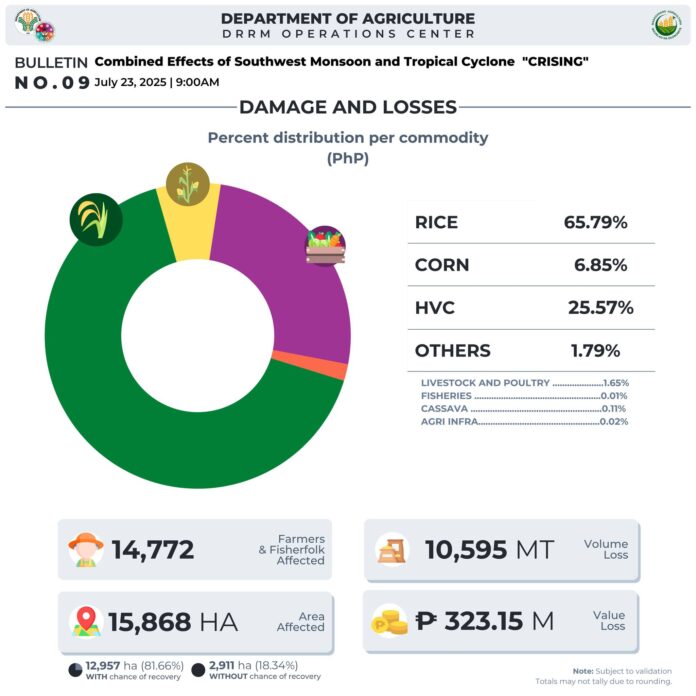The combined impact of Tropical Storm Crising and the southwest monsoon has dealt a heavy blow to the country’s agriculture sector, with damage now pegged at ₱323.15 million, a 48.6 percent increase from the previous day, according to the Department of Agriculture (DA).
In its 9 a.m. advisory on Wednesday, the Disaster Risk Reduction and Management Operations Center reported that 14,772 farmers have been affected across 15,868 hectares, resulting in a 10,595 metric ton (MT)production loss. The hardest-hit commodity is rice, with losses reaching ₱212.6 million from 14,842 hectares of rice fields, representing 6,703 MT of the crops lost.
High value crops followed, sustaining ₱82.63 million in damages, while corn losses amounted to ₱22.13 million. Livestock losses, including nearly 1,000 animals, amounted to another ₱5.33 million. Additional damage was noted in cassava, farm equipment, fisheries, and irrigation systems.
The extent of destruction spans eight regions: Ilocos, Cagayan Valley, Central Luzon, Calabarzon, Mimaropa, Bicol, Western Visayas, and Soccsksargen. Further updates are expected as field validations continue.
Despite the scale of the impact, DA Spokesperson Arnel de Mesa assured the public that price surges are unlikely, arguing that losses remain within projected annual damage from typhoons. He noted that most vegetable growers have already harvested prior to the storm, and those affected can “easily recover.”
In response, Agriculture Secretary Francisco Tiu Laurel Jr. ordered the immediate deployment of DA officials to affected areas. The agency has mobilized a ₱495.4 million allocation in agricultural inputs and is offering additional aid through Quick Response Funds, Survival and Recovery Loans, and crop insurance indemnification.
Meanwhile, in the energy sector, Meralco reported that only 2,790 customers remain without power, primarily in Cavite, Metro Manila, and Bulacan. The utility remains on heightened alert as additional weather disturbances loom. The Department of Energy has instructed the monitoring of electric cooperatives and working to ensure unhampered fuel deliveries via expressways to avoid disruptions in critical sectors, including aviation.
The situation underscores the vulnerability of Philippine agriculture to climate-related shocks and highlights the importance of rapid response funding, pre-disaster planning, and infrastructure resilience. The DA’s commitment to immediate aid and long-term recovery measures reflects ongoing efforts to safeguard food security and rural livelihoods amid worsening climate events.







